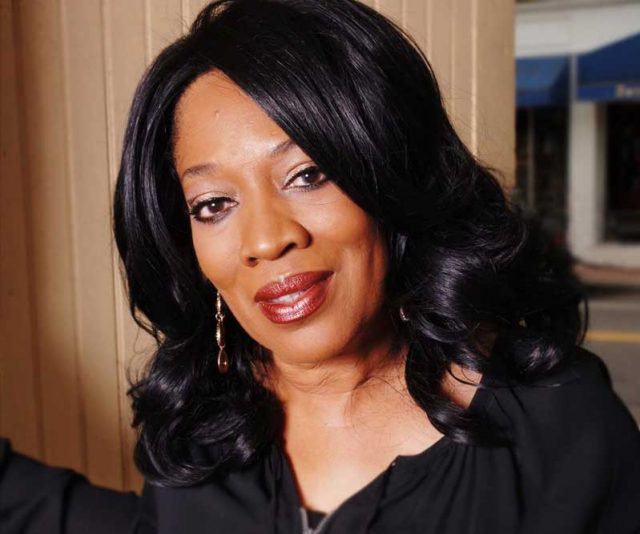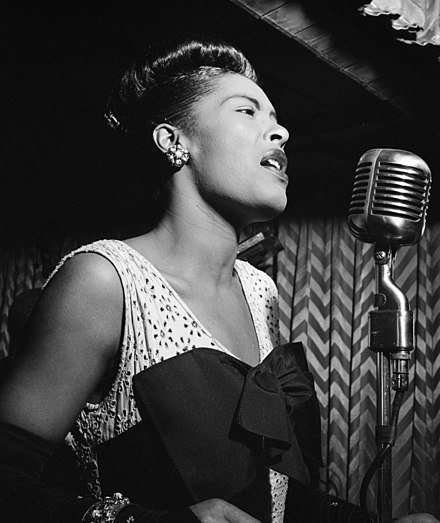by Jarrett Hoffman

That jazz singer? The great Billie Holiday, whose life and music will be explored in two events on Friday, June 18 as ENCORE begins its Juneteenth Celebration Weekend.
At 7:00 pm, the Evelyn Wright Jazz Quartet — made up of Wright herself on vocals (pictured), pianist Dave Thomas, drummer Bill Ransom, and bassist Peter Dominguez — will play a program titled “Sparked by Billie,” made up of songs that Holiday either wrote, such as God Bless the Child, or famously recorded, like Strange Fruit. See the full setlist here.
An hour earlier, at 6:00 pm, Cho will join Wright and Thomas for “Billie Holiday: Tragedy and Triumph,” a panel discussion about the intersection of those two elements in Holiday’s life. Both events take place at the Dodero Center for the Performing Arts, located on the Gilmour Academy campus in Gates Mills. Tickets are available here.
As part of an interview years ago for Tri-C JazzFest, Evelyn Wright looked back on her initial introduction to the music of Billie Holiday. So when I reached the 2008 Cleveland Jazz Legends Award recipient by telephone, I was curious to hear more about that moment.
“I was maybe fourteen, fifteen years old. My dad had a wealth of LP records back in the day,” Wright said. She heard a lot of Sam Cooke, one of her dad’s favorite artists, as well as Nat King Cole, whose music she fell in love with. It wasn’t quite the same when she first listened to Billie Holiday, on her father’s suggestion.
“I didn’t really appreciate her, because I thought her voice was not as soothing — it wasn’t as pleasant, I should say. It took me a while to really get into her, but as years have passed, I just love her and appreciate her now.”

“Everything was pretty much a sad place for her,” Wright told me. “She grew up in a brothel, and she was raped — there were a lot of things in her life that she had to live through. But through it all, she came out with a beautiful gift. I mean, she can touch people.”
Wright also loves that Holiday was an activist. “Of course, she grew up during a time of discrimination and segregation. She saw it firsthand, and she tried to express that through her music, especially with Strange Fruit.” Wright noted how government officials came to Holiday’s gigs to try to prevent her from performing that song, which hauntingly describes the lynching of Black Americans. “They didn’t want people to know of the ugliness. But she wanted to express truth.”
Given how powerful yet painful it is just to listen to Strange Fruit, I asked Wright what it’s like to sing it. “It’s a very sad place — a very exhaling place,” she said, sighing. “My family is from Alabama, so my dad saw it firsthand, the hangings. And Billie lived that too.”
When it comes to interpreting songs that were written or popularized by Billie Holiday, Wright said she takes a dual approach: making them her own, but also channeling a bit of Holiday. “You’ll hear some nuances of her on Friday night.”
Billie Holiday also went by the nickname Lady Day, but audiences might not know that her real name was Eleanora Fagan. “Billie” came from the actress Billie Dove, whom she admired, while “Holiday” came from her likely father, Clarence Halliday. On that note, to close our conversation, I asked Wright whether she ever had a stage name, and she chuckled.
“When I first started singing, I was called Miss Evelyn, or Lady Evelyn. Back in the day, that’s what we all did. But after a while, I said no, let me just use my name — you know, just appreciate who you are. But oh my gosh, that makes me laugh.”
Published on ClevelandClassical.com June 16, 2021.
Click here for a printable copy of this article



